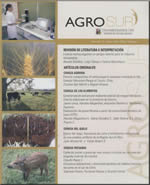ISOLATION AND IDENTIFICATION OF FUNGI IN COMPOST FROM MUNICIPAL SOLID WASTE
Main Article Content
Abstract
Municipal Solid Waste (MSW) compost is one of the biofertilizers used in Cuban urban agriculture programs. Recently its use has increased. Nevertheless, the information about the species of microorganisms that it contains and their beneficial action is limited. The aim of this work was to determine the fungal species present during the composting process. Several substrates were used: plant waste, paper and cardboard, organic waste, yagruma (Cecropia spp.) leaf, fruit, vegetables and food remains. The substrates were placed in a compost reactor with a capacity of approximately 91 L. Samples were analyzed by serial dilutions. Fungi were isolated using Potato Dextrose Agar (PDA) with antibiotics and incubated at 30 and 40 °C. Species were identified using cultures, morphological characters and taxonomical guides. Several fungal species of interest to Cuban agriculture were found, the most important being: Alternaria alternata, Trichoderma harzianum, T. longibrachiatum and Ulocladium atrum. This is the first time that the latter species has been reported to be present in MSW compost in Cuba.

